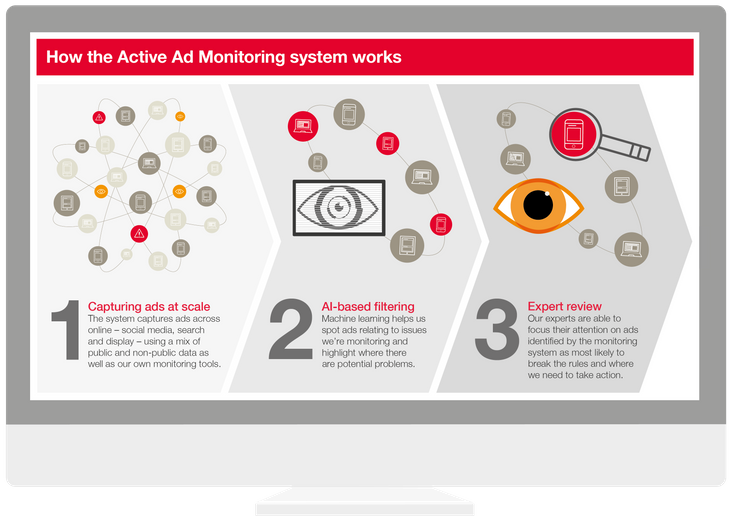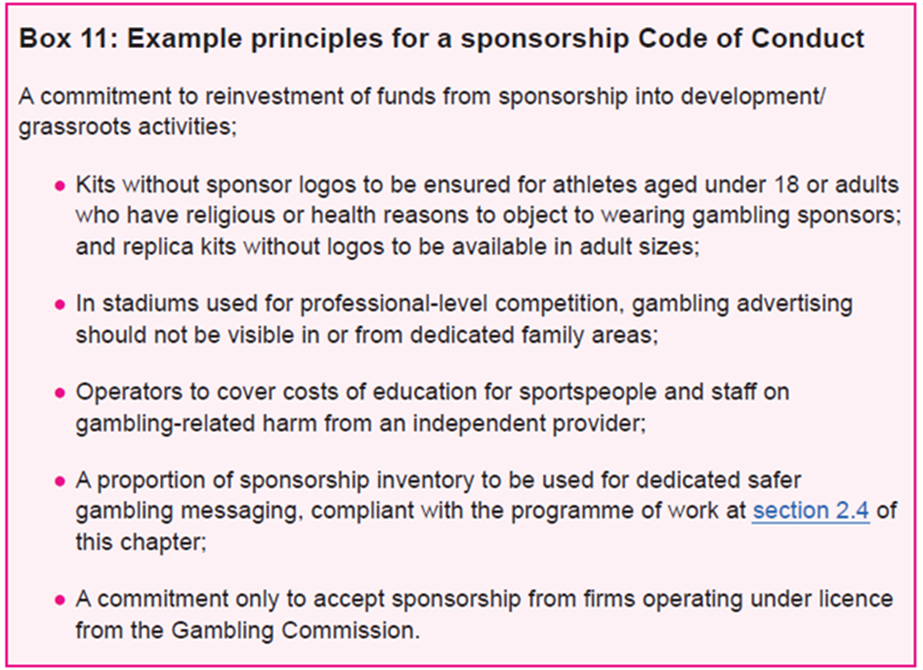Advertise with caution: ASA shine AI-fuelled torch on foul play
Traditionally, the Advertising Standards Authority (“ASA”) have relied on “limited, labour-intensive manual searches and complaints from the public” to monitor and regulate the online advertising environment. However, since 2021, they have been “investing in data science capabilities and building a team to help take on the specific challenges of regulating online advertising”.
As a result, one of the newer weapons in the ASA’s armoury is its Active Ad Monitoring system (“the AAM System”). The AAM System, which processes more than 100,000 adverts per month, uses artificial intelligence (“AI”) to proactively search for online adverts that might breach the UK Advertising Codes. Specifically, the AAM System deploys “machine learning algorithms to identify and flag likely non-compliant adverts”, following which ASA experts can manually review and take any necessary action. The process is helpfully explained in the ASA’s graphic below:

The ASA’s commitment to use technology, such as AI, to detect and enforce more effectively aligns with the approach being taken by other authorities. For example, it was recently revealed that the police force in Devon and Cornwall detected almost 300 drivers breaking the law in three days using AI – and it appears a similar (although perhaps not quite so extreme) increase in enforcement activity is coming to fruition at the ASA.
Over the course of 14 days in August 2023, the ASA published three rulings relating to gambling adverts that potentially breached the ASA’s ‘strong appeal’ tests. The strong appeal tests effectively prohibit content (including imagery, themes etc.) that has a strong level of appeal to under-18s in gambling adverts; regardless of how the content is viewed by adults.
In each case, the adverts in question were identified for investigation following intelligence gathered by the AAM System.
We discuss the recent rulings and provide our insights below.
- Novak Djokovic, Rafael Nadal, Nick Kyrgios and Stefanos Tsitsipas – of strong appeal
The adverts
This ruling concerned four promoted tennis-related tweets, featuring tennis players Novak Djokovic, Rafael Nadal, Nick Kyrgios and Stefanos Tsitsipas. Two of the tweets celebrated Djokovic’s impressive run of form, while the other two were polls which asked users to vote on tennis-related questions during the Australian Open.
The ASA’s assessment
The following factors were considered:
- Djokovic, Nadal, Kyrgios and Tsitsipas had all appeared in a Grand Slam final in the previous year;
- Djokovic and Nadal have each recently been ranked as the world’s number one player and had the joint record for the most Grand Slam titles won;
- Kyrgios reached the Wimbledon final in 2022 and Tsitsipas reached the Australian Open final in 2023; both finals attracted large media coverage and would have been of interest to under-18s.
All four were therefore ‘star’ players with a high profile and would be considered high risk according to the ASA’s guidance on the strong appeal tests.
In its defence, the advertiser pointed out that:
- most of the players’ social media followers were over 18 and that the players’ commercial partnerships were with adult-oriented brands; and
- they understood that Twitter users self-verified their age, and because that was not always accurate, they had added an additional level of assurance by targeting the ads on social media to only reach over-25s.
Having considered the facts, the ASA determined that all four players were likely to be of strong appeal to under-18s. The regulator went on to note that it would have been acceptable for the ads to appear in a medium where under-18s could entirely be excluded from the audience for all intents and purposes. However, that would only apply in circumstances where those who saw the ads had been robustly age-verified as being 18 or over, and it did not consider that the methods in question (i.e. self-verification by Twitter users coupled with behavioural targeting) met that threshold.
Accordingly, the ASA determined that the adverts breached CAP Code (Edition 12) 16.1, 16.3 and 16.3.12 (Gambling) because they used people who strongly appeal to those under-18 years of age when under-18s could not entirely be excluded from the audience.
- Granit Xhaka – of strong appeal
The advert
This ruling related to a tweet published on Twitter in February 2023 featuring the text: “Granit Xhaka pulled out this stunning finish last season in Arsenal vs Man United”. The tweet contained an embedded video which opened with a footballer kicking a ball from the corner. As he did so, a green digital circle appeared around him. As the ball travelled, a green triangle appeared where the ball had been kicked and the gambling operator’s logo appeared. The video then cut to footage from a football match between Arsenal and Manchester United and showed Xhaka scoring a goal as the crowd cheered. The score of the match then appeared overlayed onto the video.
The ASA’s assessment
The following factors were considered:
- Even though the original tweet was not published by a gambling operator, it was promoted by an operator using the Twitter Amplify feature and as such, the tweet was considered by the ASA to be an advert for that operator.
- Football is an activity that is highly popular amongst under-18s in terms of participation and viewership, there is sophisticated infrastructure around organised participation in football, and it has an exceptionally high media profile (including dedicated media for under-18s). Hence, those who play football at an elite level are likely to appeal strongly to under-18s.
- At the time the advert was seen, Xhaka was a player for Arsenal Football Club. Xhaka is therefore well-known to Arsenal fans and other football fans more widely. Xhaka is also well-known for being the captain of the Swiss national team.
- Although the tweet was only promoted to users over 25 years of age, under-18s could not entirely be excluded from the audience due to the lack of robust age-verification controls/measures on Twitter.
Accordingly, the ASA determined that the advert breached the CAP Code (Edition 12) 16.1., 16.3 and 16.3.12 (Gambling) because it featured an individual who strongly appeals to under-18s, and under-18s could not in practice entirely be excluded from the audience.
- Robbie Savage – not of strong appeal
The advert
This ruling concerned a promoted tweet which stated: “ No matter who the manager is Leeds are going down. @RobbieSavage thinks it’ll be too little, too late at Elland Road…”. The tweet contained an embedded video clip that featured Savage discussing Leeds United’s relegation prospects. The video featured the gambling operator’s logo intermittently and the BeGambleAware logo. Text at the end stated, “It’s who you play with.”.
The ASA’s assessment
The following factors were considered:
- The advert appeared in a medium where under-18s could not entirely be excluded from the audience, so the age verification ‘safety net’ could not be used as a defence if the advert was found to be of strong appeal to under-18s.
- Savage had played for several Premier League teams and at an international level for Wales. However, he had not been a Premier League player for 15 years, and his Wales career ended four years before that, so he is now more associated with punditry/the media.
- Savage’s punditry and other media appearances were primarily aimed at adult audiences e.g. tactics, team performance, financial and strategic issues etc. This is supported by audience data.
- Savage appeared as a contestant in Strictly Come Dancing in 2011, which was sufficiently long ago not to be relevant to the current generation of under-18s.
- Savage’s social media profile was unlikely to make him strongly appeal to under-18s, with only 8,810 social media followers aged under-18 collectively across Instagram, Facebook, and Twitter.
Taking this into account, the ASA ruled that the advert was not likely to be of strong appeal to under-18s, and did not therefore breach the CAP Code.
Harris Hagan insight
Below are our key takeaways from the recent rulings:
- Age verification must be robust – do not rely on Twitter. It now appears to be a settled position that if operators wish to rely on the defence that the advertisement is not accessible to under-18s, there also needs to be a backstop of robust age verification controls in place. Self-verification by users and behavioural targeting are not sufficient.
- The gambling operator is the most likely party to face the music. The Xhaka ruling demonstrates that the mere promotion of someone else’s tweet by a gambling operator may be sufficient for the tweet to be deemed an advert by the operator themselves. Operators should therefore exercise caution when using promotional tools on social media platforms, such as Twitter Amplify. As a rule of thumb, the same consideration should be given to third party promoted tweets as those that are self-published. It also notable that, although they were approached for comment, the ASA did not bring any action against the original publisher of the Xhaka tweet.
- Football pundits could be fair game. The fact an individual is a current (or recent) football pundit does not automatically mean they are of strong appeal to under-18s. Consideration should be taken of the individual’s overall appeal to under-18s, including the time that has elapsed since they were an active football player or coach (if applicable), the team(s) with which they were associated, and any other recent appearances on television and other media.
- Celebrities with ‘some’ under-18 followers need not be ruled out. It is notable that Savage’s social media following across three platforms included approximately 8,810 followers aged under 18. Clearly this number does not take duplicates (i.e. followers on two or more social media platforms) into account. However, it is still interesting that the ASA did not consider that this suggested a strong appeal to under-18s. We have yet to find out what number will tip the scales in this scenario – would 20,000, 50,000, 100,000 or even 1,000,000 followers have resulted in a different outcome? We can but wait and see where the threshold lies but, in the meantime, advertisers can take some comfort that for now, there is a precedent that (just) 1,000s of under-18 followers is a relatively safe bet.
- More ASA enforcement activity will come. Based on the recent spike in enforcement activity (three rulings in 14 days), we think it is fair to suggest that the ASA’s enhanced monitoring capabilities will increase the frequency and saturation of rulings, particularly in relation to relatively new rules such as the strong appeal tests, which are – to some degree – open to interpretation. But could the increase in surveillance activity inadvertently lead to over-interference, despite that not necessarily being the ASA’s intention? We, for one, will be interested to see whether the ASA’s current trajectory of enforcement activity in the gambling sector will continue.
Next steps
If you would like more information on the strong appeal tests and the associated guidance published by the ASA, please refer to our previous article: Getting it right: how to comply with the “strong appeal” test when using sports personalities to advertise sports betting.
Otherwise, please get in touch with us if you would like to discuss the strong appeal tests further, or if you would like our assistance training your marketing teams to advertise your brand in a compliant, yet commercially viable, manner.
With credit and sincere thanks to Adam Russell for his invaluable research and co-authorship.
